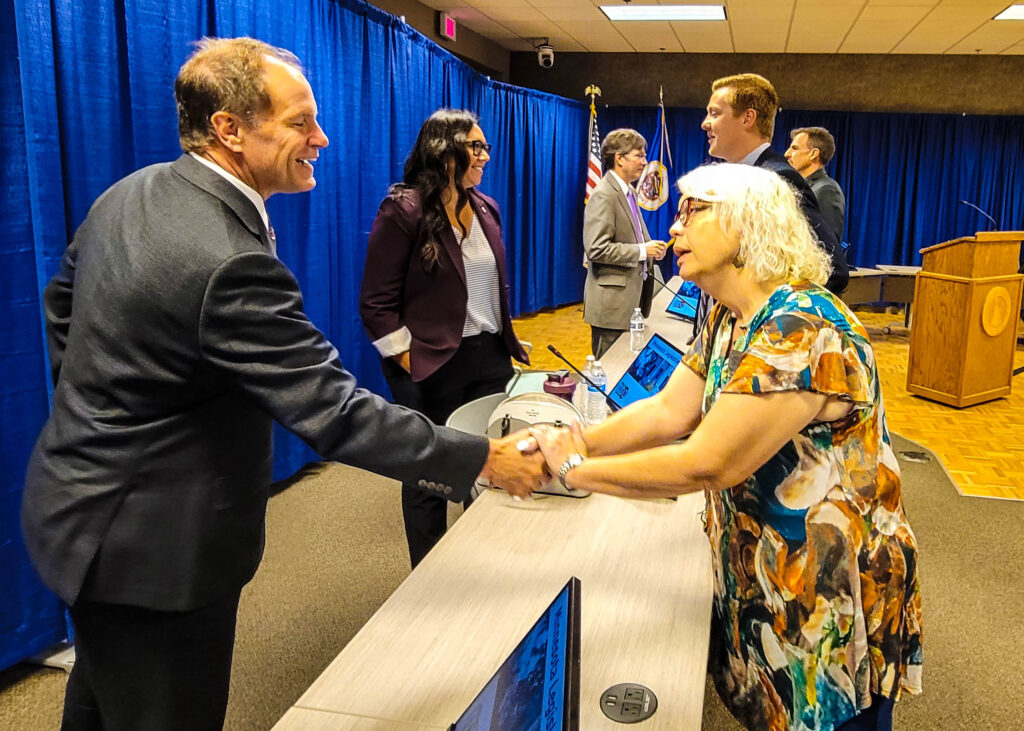
Rep. Paul Marquardt greets Churches United director Sue Koesterman at the chamber of commerce legislative forum. To his left are Rep. Heather Keeler and Sen. Kent Eken. (Photo/Nancy Hanson)
Nancy Edmonds Hanson
The 2021 Minnesota Legislature and its special sessions have been good for rural Minnesota and for Moorhead, District 4 legislators announced at an update July 22.
“You told us what you need, and we listened,” first-term House member Heather Keeler told the assembled city business owners and leaders. Keeler represents District 4A, primarily encompassing the city of Moorhead.
District 4B Rep. Paul Marquart of Woolworth emphasized the same point. Between tax relief provided in the Omnibus Tax Bill – passed in the special session’s final minutes June 30 – and ample financial relief channeled to businesses and individuals through the American Rescue Plan, he touted measures that aid Minnesotans as the recovery from the Covid-19 pandemic continues. At the same time, he pointed to better-than-anticipated revenues and a $2.7 billion state surplus as positive signs for the state’s recovery and growth.
Marquita sponsored the tax bill along with his Republican counterpart, Sen. Carla Nelson of Rochester. The bill produces $49.1 billion in revenue over the biennium and provides $4.2 billion in refunds, aids and tax credits, including $761 million in new tax cuts and credits.
Businesses are receiving another $80 million in Ovid-related relief. Those who participated in the Paycheck Protection Program get complete tax forgiveness on those funds. At the same time, the state business property tax exemption has been raised from $100,000 to $150,000. “That represents 40% of what businesses have paid,” he pointed out.
District 4 Sen. Kent Eken of Twin Valley pointed to $250 million in “Hero Pay” appropriated for Minnesota’s front-line workers as a notable benefit to rural hospitals and clinics. Health care workers, also including those in long-term care, will receive bonus pay through funding to the state under the American Rescue Plan. A bipartisan committee is currently working on the specifics of its distribution.
Moorhead’s location on the border provided another focal point for the legislative team. During the 2019 session, the Legislature authorized making the Border Cities Enterprise Zones a permanent fixture in the state budget, rather than relying on biennial appropriations. But they came up short on another goal dear to housing advocates, a proposed revision of Minnesota’s statute on the frost depth required for footings in residential construction. Currently Minnesota requires a depth of five feet; in Fargo, builders need only go to four and one-half feet. That difference, Keeler said, can amount to a substantial difference in cost. “We want to be competitive in housing,” she said. “When the same home can cost $10,000 less across the river, it makes it difficult for home builders.”
While the measure ultimately failed, she added, “we’re not going to stop advocating” for the change.
Marquart addressed the state’s adoption of clean car emission standards intended to put more electric vehicles on Minnesota highways. The bill was the subject of acrimonious debate; it was finally passed with the provision that it will not take effect until 2024 after another gubernatorial election. Minnesota became the 15th state to adopt the California rules. “I have mixed feelings,” Marquart said. “I know where car dealers are coming from in opposing it. But I think the right answer is somewhere in between. We do need to open it up for more electric vehicles.” He applauded the compromise that passed the rules, but delayed their implementation until 2024 after the next gubernatorial election. “We’re going to let the people of Minnesota decide,” he said.
Keeler addressed the polarized political climate she encountered on arrival in St. Paul, stressing efforts to find a way forward in the legislative chambers. “In the end, it’s about relationships,” she said. “The team I cam in with has always worked hard to build trusting relationships across the aisle. It’s all about finding that sliver of agreement – understanding and communicating our common values and goals.”
It was left to Mayor Shelly Carlson, who moderated the discussion, to bring up a less headline-grabbing achievement that nevertheless may mean a lot to Moorhead. Before introducing the speakers , she expressed her thanks that the Legislature authorized the city to bring a sales tax proposal to the voters in the next election. That could be the key, she said, to funding the long-discussed new regional library and community center. “Thank you for getting the authorization,” she told the delegation. “It’s the first step to move the plan forward.”

